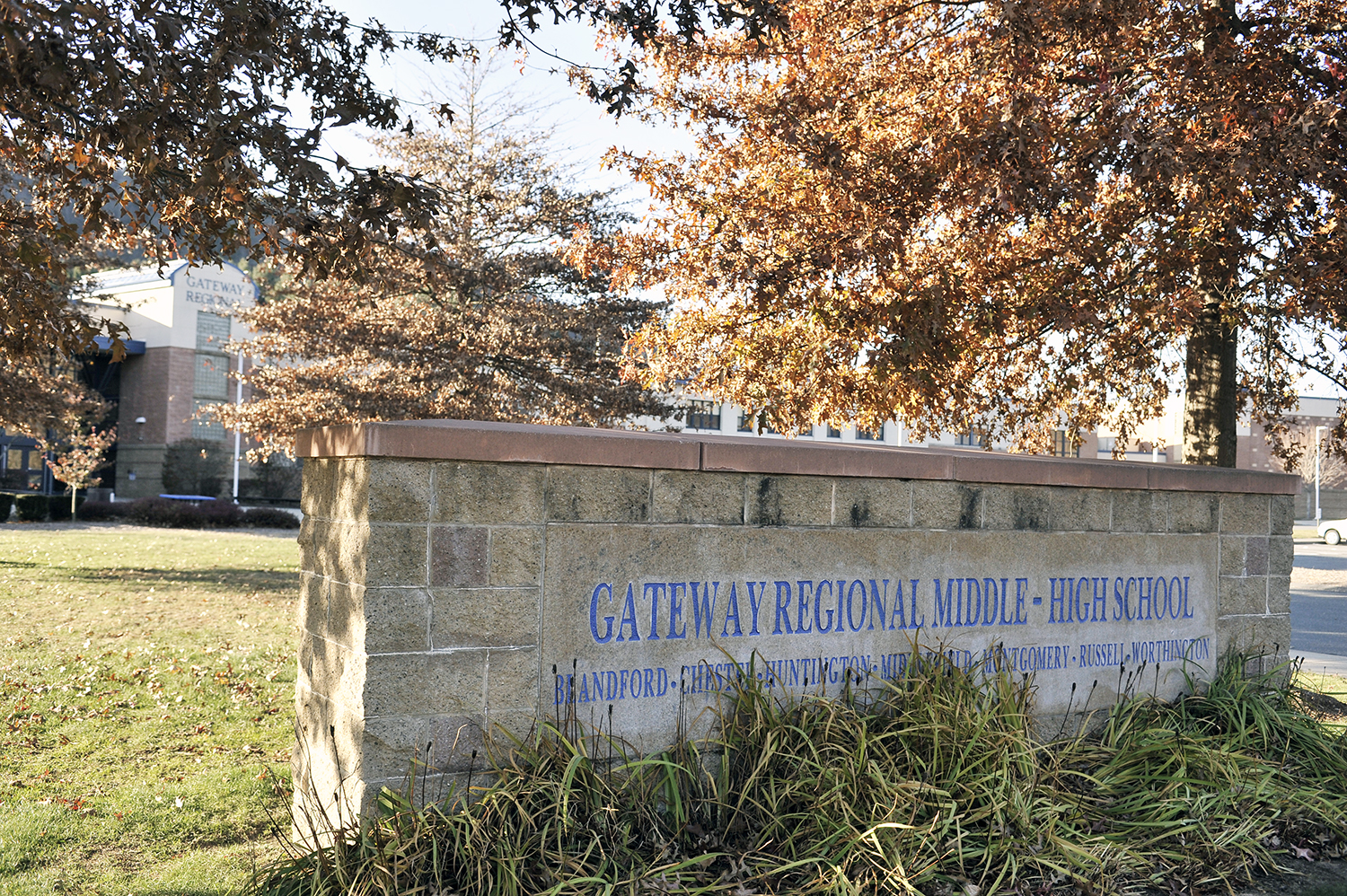HILLTOWNS – Over the next week and a half, residents at three Annual Town Meetings will vote not only on the Gateway Regional School District budget, but on an alternative assessment method going forward for the Gateway hilltowns. In addition, residents in the town of Chester will be voting on whether to give a voluntary contribution of $40,000 to offset the town of Russell’s FY19 alternative assessment.
On the warrant of each of the six towns is an article to see if the towns will vote to amend the way the above minimum assessment is calculated for each town. Traditionally, in the statutory assessment method, the above minimum assessment is calculated based on the March student census and each town’s percentage share of students. Due to the low populations in the hilltowns, the shift of just a few students can make a dramatic difference in the statutory assessment to a town, equal to more than $100,000 in several instances in recent years; while other towns may have a decrease in that same year.
In the alternative assessment being proposed on town warrants, the above minimum assessment to all the towns will be based on the percentage increase of the GRSD budget. For example, this year, the Gateway budget contains a 1.9% increase that was approved by the School Committee on March 14. If the alternative assessment is approved by all six towns, which is a requirement for the change to take place, all of the towns’ above-minimum assessments will increase by 1.9%. (As a baseline for the alternative assessment, the last five years of each town’s assessments were averaged for that town as a starting point.)
The alternative assessment was developed and approved by the School Committee in conjunction with town officials from all six towns, and in collaboration with the Massachusetts Association of Regional Schools (MARS) and the Department of Elementary and Secondary Education (DESE). MARS has led facilitated discussions with the School Committee and town officials for eight months to find a way to stabilize the budget process. Together, they came up with this solution, which would ensure that the towns would have no more than a 2.5% increase in their assessments in any given year.
“We’ve been working on this for eight months now. It doesn’t penalize towns for an increase of students in that town,” said Andrew Myers, who chairs the Chester Finance Committee and the Hilltown Collaborative, and who has been a part of the facilitated discussions. “We all put our heads together. If Gateway comes up with a 2% increase, that’s what all the towns will get,” Myers said.
“The reason everybody wants to do this is to even out the playing field,” said Gateway Superintendent David B. Hopson, adding,” It’s an interesting breakthrough, having the towns come to Annual Town Meetings in support of the budget.”
To date, Blandford, Middlefield and Montgomery have approved the change. The last three towns to vote at their annual town meetings are Huntington on Monday, June 4; Chester on Saturday, June 9, and Russell on June 11.
The challenge this year is that of the remaining three towns to vote, both Huntington and Chester will fare better this year financially with the alternative assessment.
For Huntington, the alternative assessment would reduce their assessment to Gateway by $45,000. At the town forum in advance of Monday’s Annual Town Meeting, Selectmen Edward Renauld and Darlene McVeigh told residents it is important to pass the alternative assessment not only to reduce the town’s assessment this year, but also to stabilize assessments over the next five years and allow for planning.
The town of Chester has an even bigger incentive. Due to an increase of 18 students in the March census, they face an increase of $164,000 in the traditional statutory assessment method. If the alternative assessment passes all the towns, that increase is reduced to $30,000.
The town of Russell, however, lost 26 students in the March census, and in the traditional statutory assessment method would have a decrease of $97,000 in their assessment this year. The alternative assessment would be an increase over last year of a little more than $40,000.

Gateway Regional Superintendent Dr. David B. Hopson (WNG File Photo)
“For Chester, the amended (alternative) assessment is the biggest advantage. For Russell this year, it’s the biggest disadvantage,” Myers said. He called Russell’s situation “an anomaly,” because they lost 28 students in the March census, a big shift for any town. According to Hopson, the number of students from Russell has already increased since March.
Russell was one of two towns that stood to lose this year from the alternative assessment. Blandford also had a decrease of $48,000 in the statutory assessment due to the loss of 8 students in the March census, and an increase of $30,000 under the alternative assessment method. “Blandford basically gave up $80,000 to pass the amendment. For Blandford, they saw it as an insurance policy,” Myers said.
Town officials in Chester understood that financially the new method was a hardship for Russell. They decided to find a way to relieve that town of the $40,000 increase they were facing over last year’s assessment in the new method, by offering to offset it. “We sharpened our pencils and came up with what we thought would be a fair plan for Russell,” he added.
Basically, if the alternative assessment passes Huntington, Chester and Russell, then the town of Chester will increase the $30,000 assessment they would pay to Gateway with a $40,000 voluntary contribution to be used to offset Russell’s assessment.
The plan first had to be approved by the Department of Revenue (DOR), the Division of Local Services (DLS), DESE and Chester’s town counsel. They found it to be unique, but for the public good, according to Myers. “It’s unusual. This has never been done before,” Myers said, adding, “The DOR gave us their blessing.”
Myers also said the DOR gave them the wording for the warrant at the Chester Annual Town Meeting asking residents to approve the additional $40,000 offset to Russell. The amendment is contingent on all three remaining towns approving the alternative assessment method.
Myers said even with the additional offset to Russell, Chester residents will still pay less with the alternative assessment of $30,000 plus the $40,000 offset than they would with the statutory assessment of $164,000. He said he tells people they have to spend $40,000 to save $90,000. “It’s in our best interest, no question. It’s also in Russell’s best interest,” Myers said.
“To my knowledge, no one’s ever done this before. I give a lot of credit to Chester’s town officials who see this as a way to grow the school, and are willing to step up to the plate,” Hopson said.
Ruth Kennedy, Finance Committee member from Russell, who is also running for the School Committee in a contested election with Sarah Page on Monday, June 4, is not as certain.
“Part of me says it’s a good idea, it’s a good start. I like the idea that the towns came up with this,” Kennedy said. “I don’t like the idea of one town taking $40,000 to save Russell. My gut feeling is it’s a bribe for Russell to pass the amendment,” Kennedy said. She also said that while financially this year she doesn’t support it for the town, she agrees that “in the long run, it might make a difference.”
Nevertheless, last Thursday, Kennedy said she still didn’t know how she’ll vote. “I might vote for it,” she said.
Sarah Page, who is running against Kennedy in the race for School Committee, said she heard about the alternative assessment at Russell’s public forum on May 15. “From what I heard from a lot of different town representatives, it seemed like a great choice for all the towns,” Page said. “It’s important to continue to go forward and not backward,” she added.
Myers said this is the year to do it. “We have the approval from DESE and DOR. Next year will be a whole other ball game,” he said.









